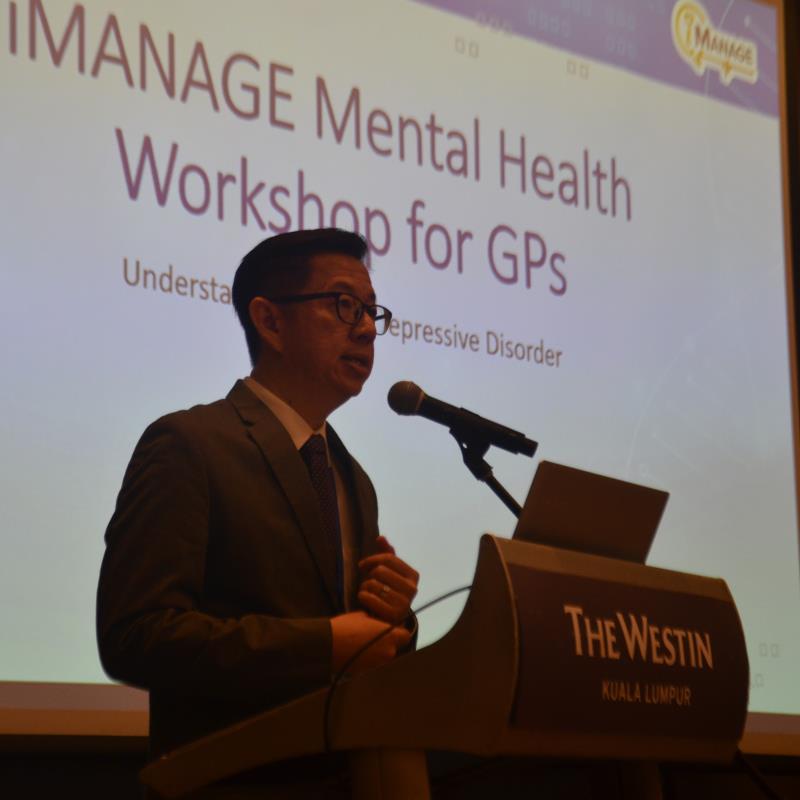 Dr Ting Joe Hang
Dr Ting Joe HangMental health becomes the agenda of iMANAGE’s second workshop. The workshop saw participation from GPs with an interest in providing mental health support to their patients.
The workshop was chaired by Dr Ting Joe Hang, otherwise known as Joe. The panel of speakers consisted of Joe, Dr Hazli Zakaria, consultant psychiatrist at Universiti Kebangsaan Malaysia Medical Centre (UKMMC) and president of the Malaysian Psychiatric Association; and Assistant Professor Dr Mohd Faiz Md Tahir, Department of Psychiatry, International Islamic University Malaysia (IIUM), Kuantan.
Joe started the ball rolling with the topic of understanding and assessing major depressive disorder (MDD), and this was followed with pharmacological approaches for treating MDD. Joe said MDD isn’t always clear cut, and is a complex and heterogenous syndrome covering a wide spectrum of symptoms and degrees of severity.
MDD impacts areas of functioning such as work, social, family, cognition, and sex. For many people, work is also a defining aspect of their self, and thus early diagnosis is crucial in the early optimized treatment of MDD. The different classes of antidepressants include tricyclic antidepressants (TCAs), selective serotonin reuptake inhibitors (SSRIs), serotonin-norepinephrine reuptake inhibitors (SNRIs) and more. Joe noted there is no one size fits all strategy in treating patients with MDD. Appropriate treatment will depend on the side effects, safety, tolerability, response of the patients to treatment in prior episodes, patient preference, and cost.
Hazli noted that it was difficult to treat severe or melancholic MDD with nonpharmacological means alone. Psychotherapy alone is possible and equipotent with pharmacological treatment in patients with mild-to-moderate acute depression. Psychotherapies include cognitive behavioural therapy (CBT), interpersonal psychotherapy (IPT), psychodynamic psychotherapy, problem-solving therapy, marital and family therapy, and group therapy.
In delivering treatment to patients with MDD, the patient-doctor relationship is of utmost importance. A patient-centred model of practice helps a doctor acquire accurate diagnostic information and understand the patient’s experience of presenting problems. Thereafter, involving the patient in decision-making will help improve outcomes and depressive symptoms. Effective communication will help patients to understand and accept their diagnosis. The patient-doctor alliance is a central clinical feature in building a therapeutic relationship, he said.
A representative from the Mental Illness Awareness and Support Association (MIASA), a non-governmental organization founded by patients, was also there to share her journey with MDD and her path to remission.
Mohd Faiz and Hazli engaged in a role-playing session to illustrate the type of patients who would come into a GP clinic and how to approach these patients. They touched upon the type of words to use and how to look out for red flags or physical manifestations of mental disorders. Patients often present at their GP clinics and complain about symptoms unrelated to mental health. It is the role of the GP to utilize the familiarity with the patient and tease out underlying mental disorders once physical or organic factors have been excluded.
iManage, an educational programme consisting of three workshops, is supported by Upjohn, a Pfizer division. MIMS is the content partner while Upjohn is the programme sponsor. Various medical societies such as the Malaysian Medical Association, Malaysian Psychiatric Association and Malaysian Society of Hypertension are content partners of the programme. The other two workshops focused on pain management and cardiovascular disease.